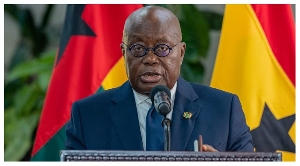- Home - News
- TWI News | TV
- Polls
- Year In Review
- News Archive
- Crime & Punishment
- Politics
- Regional
- Editorial
- Health
- Ghanaians Abroad
- Tabloid
- Africa
- Religion
- Election 2020
- Coronavirus
- News Videos | TV
- Photo Archives
- News Headlines
- Press Release
General News of Tuesday, 15 April 2008
Source: GNA
Ghana supports ban on cluster munitions
Accra, April 15, GNA- Nana Obiri Boahene, Minister of State at the Ministry of Interior on Tuesday reiterated the nation's total support for the ban of cluster munitions because of its devastating effect on innocent civilians during wars.
He said Ghana's position on the ban was based on humanitarian grounds because innocent civilians in war countries were greatly affected as some died or were maimed. Nana Boahene was speaking at a press conference the Foundation for Security Development in Africa organised to draw attention to the dangerous activities cluster munitions could cause and the need to lobby for the UN to ban its use by 2008.
"Even though cluster munitions have not reared its ugly head in Ghana, we find it prudent to join the world-wide campaign against the menace that has befallen humanity," he said.
Cluster munitions are weapons comprising a number of explosive sub munitions or bomblets that are dispersed from container by aircraft during wars. The container opens over the target and saturates an area, which can be the size of several football fields with explosives.
It also has indiscriminate effect at the time of the attack because they scatter sub munitions over large areas and kill or maim any civilian caught in its track.
Mr. Boahene called on countries to join the campaign to eradicate the use of cluster munitions to make life safe for people staying in war countries. Mr. Jones Applerh, Desk Officer for Small Arms at the Ministry of Interior, giving an overview said cluster munitions were first used by the United State (US) in Vietnam, Soviet Union used it in Afghanistan, Kosovo, Eritrea, Ethiopia and it was also used in the 1991 Gulf war.
He noted that the US dumped over 248,000 sub munitions over Afghanistan and caused casualties whiles 462 people were killed and injured from 1998 to June 2006 of which 47 percent were children. A total of 10 countries have used cluster munitions in Africa and most of these-- Angola, Chad, DR Congo, Eritrea, Ethiopia, Uganda, Guinea and Guinea-Bissau are contaminated, Mr Applerh said.
He said two of those countries in Africa had produced cluster munitions, 14 countries had stockpiles, while 13 of the 14 had imported the weapons. Mr Daniel Andoh Programme Manager of the United Nations Development Programme said Mr Ban Ki-moon, United Secretary-General had urged States to institute a legal instrument to tackle the use of cluster munitions. He said states were urged to take domestic measures to immediately freeze the use and transfer of all cluster munitions until such legal framework became a reality. Mr Andoh said cluster munitions obstruct economic development and reconstruction.










